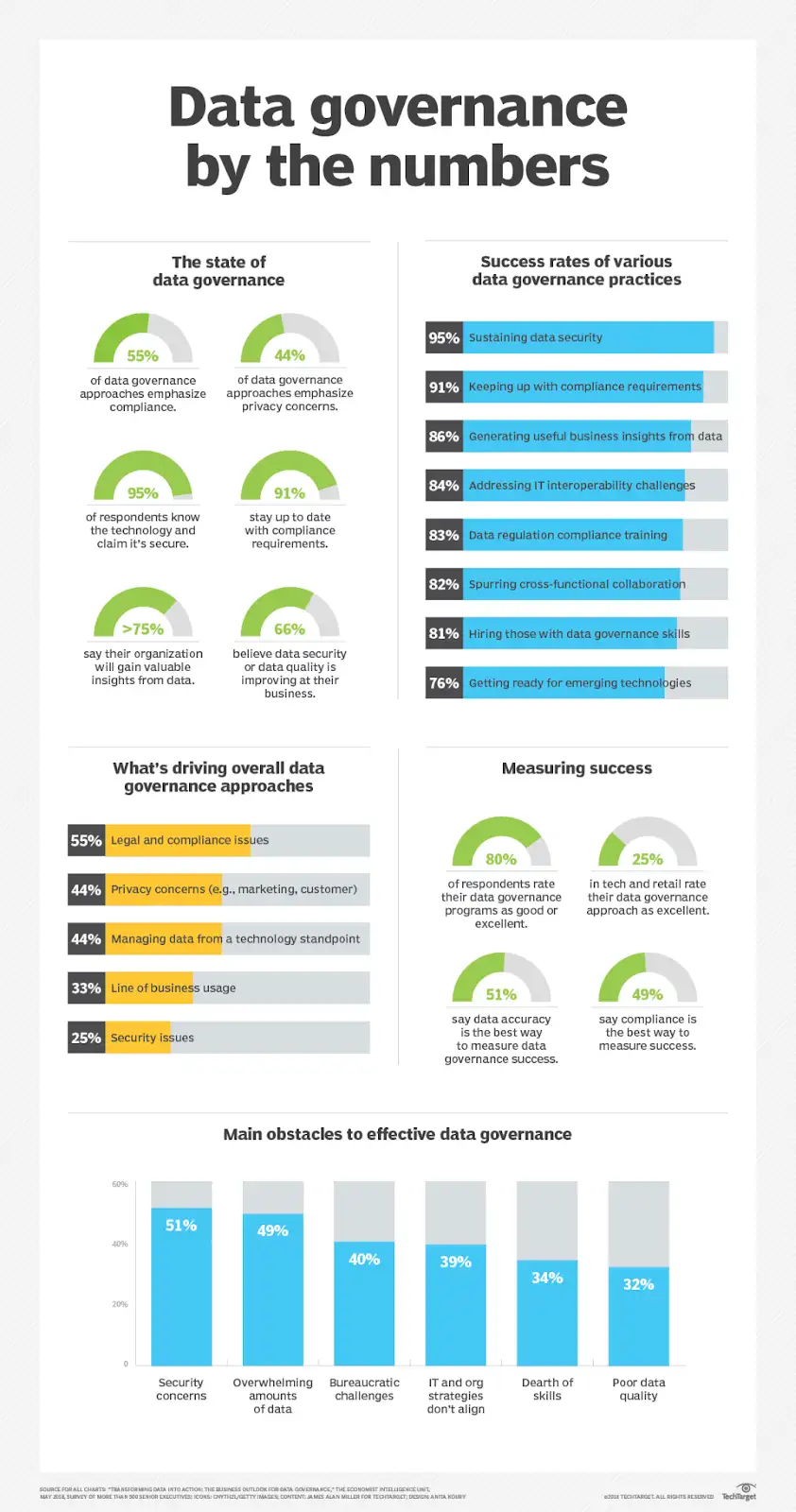In this article, you’ll learn:
Depending on how well it is managed, data can either be a valuable asset to an organization — or pose a significant threat. Poor data quality can have a substantial financial impact on a business. In fact, a recent Gartner study estimated that bad data costs companies an average of $12.9 million a year.
Add to this the importance of data security and the risk of data breaches, and it becomes clear why the data governance market is growing exponentially. More and more companies are adopting a data governance strategy, so if you haven’t already, there’s no time like the present.
What is data governance?
Data governance is an umbrella term that refers to the individuals, technologies, processes, and systems that manage an organization's data.
This means establishing who is responsible for your strategy, which may mean creating a dedicated data governance team. It will also require utilizing new tech and software to manage your data, such as data warehouse services. Elevate your business's efficiency and decision-making capabilities through strategic data warehouse implementation
Successful data governance ensures that data is of good quality, protected, and accessible.
Challenges of data governance
With the rise in remote working, you may already be familiar with challenges involving data management and security. Many organizations have had to learn how to protect data while working remotely while also ensuring it is readily accessible.
Data governance comes with a whole new set of challenges. It is a big task that has wide-ranging impacts on a business.
Impact on employees
One aspect of data governance is that it may require redrawing responsibilities and job roles. This means individual employees may be directly affected, which can cause pushback.

Convincing stakeholders
Unfortunately, a successful data governance initiative doesn’t come for free. Costs will include purchasing new software and hiring new personnel. Ensure the success of your business with a comprehensive software architecture review.
Persuading stakeholders to divert the necessary funds for its implementation can be a challenge. But the value you can gain outweighs the expenditure. We’ll go into more detail on that later.
Lack of resources
This doesn’t necessarily mean money, though that may be an issue itself. The reality is that data governance is complex and multi-faceted.
It requires a lot of planning and decision-making. This may mean a large amount of teamwork and dedicated hours before it even gets off the ground. For many organizations, investing a high level of resources may be a difficult decision.
Benefits of data governance
Though it’s true that data governance comes with challenges, the benefits more than make up for it. Strategies for furthering your organization can come in many forms — from increasing your social media presence to learning how to create a powerful business presentation.
But data governance is a guaranteed way to optimize every area of your organization.
 Image sourced from GOV.UK
Image sourced from GOV.UKPercentage of organizations where cyber security is seen as a high priority for senior management.
Improved data security
Every organization has a responsibility to ensure that its customer and employee data is protected. While recent laws have led to big improvements in this area, the risk remains.
Data breaches are often well publicized and can be catastrophic for the reputation of a business. The above graph indicates that cyber security is increasingly becoming a priority for senior managers, as the threat of data breaches persist.
Understandably, customers do not want to trust their information with a company they believe will not protect it. A data governance plan increases data security and compliance, meaning a much-reduced risk of this happening. Superior data governance requires complying with the necessary legal frameworks, which includes applying NIS2 as an essential security measure for businesses.
Superior customer support
Centralized data, on a system that is accessible and easy to use, is a huge benefit to your customer service standards. Data governance prioritizes keeping accurate records of your customers’ details, transactions, and communications.
An enterprise consent management platform (CMP) streamlines this process by providing a unified platform to manage all customer consents and preferences.
This allows your customer service team to provide tailored and personal support when necessary. Having data that is easy to understand and navigate at their fingertips will enable them to excel in their roles.
Boosts efficiency
Data governance aims to install a framework that clearly defines roles and processes. This means outlining who handles, distributes, and is responsible for data across departments.
This includes establishing a data governance team, but also who is tasked with data management within different teams. Communication between departments becomes streamlined, and a more efficient working model is achieved. This brings us nicely to the next benefit.
Increased collaboration
Defined roles, rules, and efficient communication leads to a higher level of collaboration across your organization.
This is because it removes any confusion or friction over who should have access to certain data. If the rules and responsibilities are clear, data that should be readily available to certain people is easy to access. Likewise, restricted data is clearly understood to be only accessible to certain people. Any misunderstandings or disagreements are then avoided.
Improved financial reporting
Another way in which data governance can benefit your organization is its impact on financial reporting. Managing your data well assists with financial regulations and providing accurate reports.
One of the purposes of data governance is to have a clear record of who owns data, where it originated from, and to ensure its validity. The result is traceability and accuracy, which is a big tick for your finance team.
Informed decision making
Bad data can result in poor decision-making. Modern business is data-driven, and a team relying on inaccurate data can make costly mistakes.
Data governance delivers increased accuracy and reliability. So, you can trust that your team is better placed to make well-informed business decisions. It is an investment that can bring great financial rewards to your business.
Better data quality
As previously mentioned, poor data quality can negatively impact your company’s revenue. A data governance initiative looks to enhance this quality by setting goals for its use and, as a result, improves the way it is recorded.
Knowing exactly what you hope to gain from your data is essential. This will help inform your strategy for data collection and management. As indicated in the survey below, data quality is the most pressing reason organizations invest in data governance — don’t get left behind.
 Image source
Image sourceData governance models
Choosing the right data governance model for your organization is of utmost importance. Because enterprises vary so greatly in size and structure, one model will not fit all. There are three main types to choose from, which have different benefits depending on your needs.
Federated model
This model is suitable for organizations with teams that have different data governance requirements. Resources are distributed across the teams, but a centralized leader maintains responsibility for data governance in the organization.
Likewise, standards and policies are still centralized. This removes redundant hierarchies and allows for streamlined, flexible data governance within your organization.
Centralized model
This model has a top-down structure. Ordinarily, one or several individuals will be appointed as data governance leaders. Their responsibilities will include controlling the master data, which they can disseminate to others upon request.
One of the key benefits of this model is that it provides greater data security. It is a particularly advantageous framework for organizations that handle sensitive data and have a high number of personnel.
Decentralized model
Sometimes it’s good to take control, such as making your own eCommerce strategy. Similarly, a decentralized model allows teams and individuals to maintain control of their own data sets. They are then able to create and distribute them as required. While this means multiple groups of authority, they are all subject to the same standards, policies, and procedures.
A data governance committee will often decide upon these practices. This model is easier to set up than the others and is particularly helpful for organizations with multiple offices or sites.
Implementing a data governance initiative
Once you have decided which data governance model best suits your needs, it’s time to start thinking about putting it into action. This can be an intimidating prospect, as data governance will affect most areas and employees in your organization.
Set a goal
Having an end goal in mind will boost focus and motivation for all involved. Setting smaller goals that you can celebrate along the way is also a good idea.
Your goal could be improving data quality, increasing data security, or creating faster processes. Establish what your key metrics are going to be at the beginning so you know what you are working towards.
Take it slow
The best course of action is to start small and work your way up or out. Keep it simple by starting with the data of just one team. Assess the state of their data sets, then set a goal for its improvement.
Implement your new procedures, technologies, or responsibilities — then analyze the results. This will give you the confidence to start rolling it out.
Choose the right tools
Good tools can make it much easier to begin your data governance program. If you work with tabular data, you’re probably already using pandas DataFrames. Likewise, let your goals and strategy inform your choice of software and technologies.
The right tools will help you with automation, management, and integration. They will help get you on the path to achieving your goals in efficiency, security, and growth.
Data governance is a sound investment
There’s no denying it is a big undertaking, but a solid data governance initiative can only improve your organization. Be patient, be consistent, and keep your end goal in mind. It may take time, but there are major benefits to reap at the end of the road.
Did you enjoy this article? Give Pics.io a try — or book a demo with us, and we'll be happy to answer any of your questions.
Author

Pohan Lin is the Senior Web Marketing and Localizations Manager at Databricks, a global Data and AI provider connecting the features of data warehouses and data lakes to create lakehouse architecture with the help of Databricks MapReduce. With over 18 years of experience in web marketing, online SaaS business, and eCommerce growth. Pohan is passionate about innovation and is dedicated to communicating the significant impact data has in marketing. Pohan Lin also published articles for domains such as SME-News and PingPlotter.



